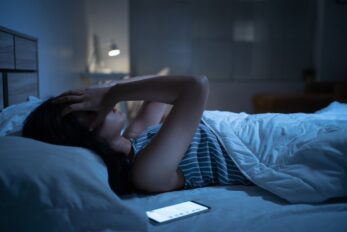Here’s the thing: Sleep isn’t as simple as being awake or being asleep. There are actually multiple phases of sleep that we cycle through every night—if we’re sleeping well. When we’re not sleeping well, these cycles are disrupted and we feel it the next day (think fatigue, headaches, all the things). So, what are you doing in your everyday life that’s sabotaging how well you sleep? Here are our top three culprits:
1. You’re not moving enough throughout the day
A survey conducted by the National Sleep Foundation found that over 75% of exercisers reported having slept well over the last two weeks, compared to just 40% of non-exercisers. All it takes: 20 minutes a day. You don’t have to sweat, just get up and move. Yoga, walking, whatever. In fact, if you exercise too close to bed, you may feel wired because exercise is a stimulant, so try not to get your sweat on at least three hours before you turn out the lights.
2. You’re getting too much screen time
If you haven’t heard about the effects of blue light on your sleep yet, now’s the time. Blue light is the spectrum emitted by all the devices that are glued to you through the day: your laptop, phone, TV, you name it. And it messes with our circadian rhythm–the internal clock that regulates our sleep and REM cycles.
According to Dr. Saurabh Sethi, MD, MPH, “When staring at your phone or other electronics in the dark, your pupils dilate, which allows more harsh light in. This, in turn, inhibits the production of melatonin, which is a natural hormone vital for falling and staying asleep.” So, do yourself a favour and avoid any and all devices at least 30 minutes before bed.
3. You’re drinking too much caffeine – or alcohol
In the day of “But first, coffee” memes, it’s no secret that we all fuel our day with caffeine—but if you’re sipping the sweet nectar of the gods within six hours of bed, you’re setting yourself up for a bad night’s sleep. In fact, a study in the Journal of Clinical Sleep Medicine found that people who consumed caffeine within six hours of bed actually took twice as long to fall asleep and slept 40 minutes less compared to those who consumed a placebo.
And if you think you’re in the clear because you only drink coffee in the morning, think again: Alcohol disrupts your sleep, too. According to a study in the Journal of Clinical Psychopharmacology, consuming alcohol before bed increases the likelihood of waking up in the night and decreases the amount of REM sleep you get—that deep, restorative sleep.
According to Dr. Sethi, “This is likely caused by the fact that alcohol interferes with your hormones like adenosine, a sleep-inducing chemical. You’ll doze off fast, but you’re more likely to stir in the night after drinking.” It doesn’t mean you can’t have a nightcap, but keeping it to one drink per night at least two to three hours before bed is your best bet for a solid night’s sleep.
We all know sleep is essential to our health and wellbeing—everything from feeling more energetic and positive to preventing health issues like heart attack and stroke. So, if your sleep is suffering lately, try our tips to stop sabotaging your sleep. And follow our Facebook page for more tips throughout the month of December—we know how much caffeine and alcohol we can down in the month of merrymaking, so we’re here to help you survive the holidays and usher in 2020 with the best sleep of your life.






